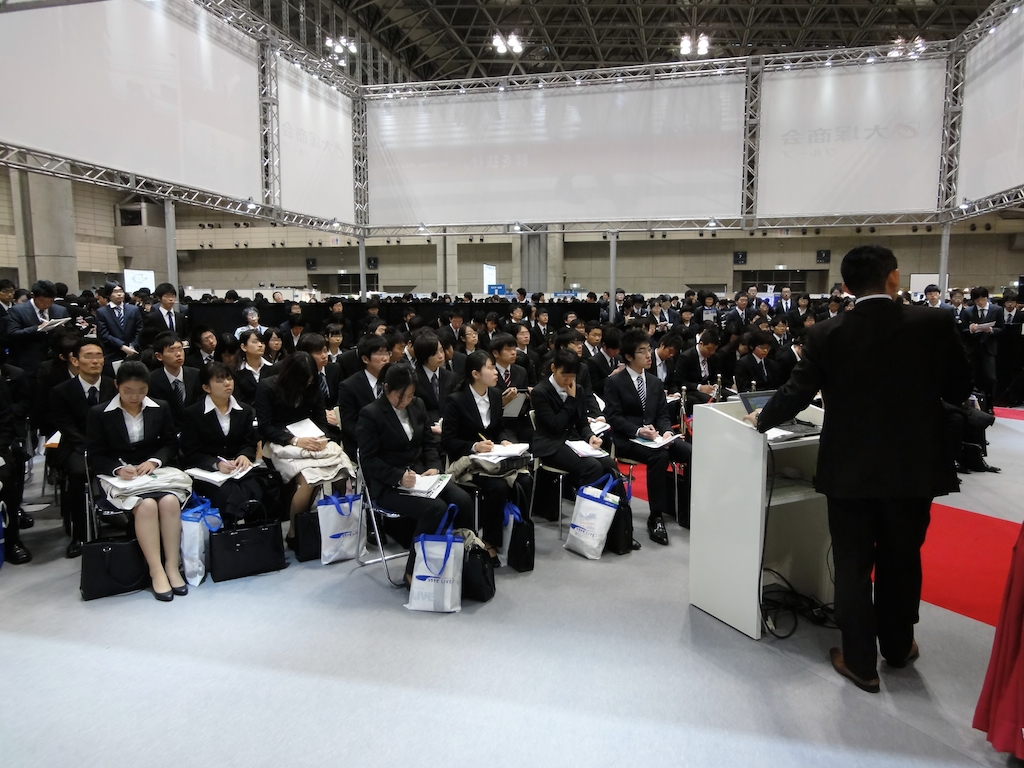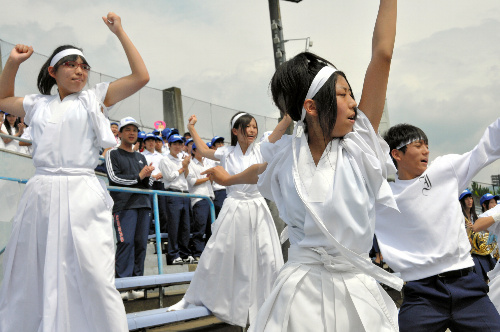
source: wikipedia
Annual salary for new graduates in general
The previous blog post shows the list work fields and number of foreign residents in the field focusing on the specific fields that accepts foreign new college graduates diligently such as education, information technology, and academia and special professions. I did not go into details one of the most important things for the employment; “SALARY“.
On this blog post, I will show a list of companies’ monthly salaries for new graduates and brief employment systems in Japan such as welfare and insurances.
The average of annual new graduates salary is said to be around ¥2000000 – ¥2300000 ($20k – 23k) and monthly salary is around ¥190000 ($1900) in 2013. This annual salary includes a year end bonus and without tax and insurances.
Before go through a ranking of companies and welfare, let me introduce the insurance system in Japan. All Japanese companies are required to join a insurance program so called “social insurance” 社会保険/shakai hoken/ which includes health insurance, workmen’s compensation insurance, unemployment insurance, and welfare annuity insurance. Social insurance is mandatory for all the companies including foreign capital companies in Japan. The annual and monthly salaries in this post DON’T include tax and the social insurance.
Your net income is
your monthly net income = YOUR MONTHLY SALARY – (Tax and the insurances).
Tax and insurances depend on where you live and work and your annual salary, but roughly speaking, it is around $300 – $500.
I will explain the insurance and tax for more details in a future post.
The list below shows the ranking of Japanese companies which offers high annual new graduates salary in Japan (again this numbers are without tax and insurances).
Ranking of Japanese companies’ monthly salaries for new graduates
| Company | annual salary JPY | field |
|---|---|---|
| Cyber Agent | 340000 | IT media/Advertisement |
| NIWS Co | 319000 | IT SI |
| Doshisha Corporation | 302000 | Distribution |
| Cybozu | 300000 | IT software |
| CEREBRIX | 300000 | Consulting |
| Yoko Toshikaihatsu co. | 300000 | Real Estate |
| Cybird Holdings | 295000 | IT mobile contents E-commerce |
| Nikko Cordial Corporation | 285000 | Finance |
| Prime Link | 285000 | Food business/restaurant chain |
| AJS | 280000 | IT Server Hosting |
| Hoosiers Corporation | 280000 | Real Estate |
| Noevir | 275000 | Cosmetics |
| Lac Co., Ltd | 271000 | IT security |
| LCA Holdings | 270000 | Consulting |
| Forval | 270000 | IT consulting |
| MAMEZOU holdings | 267000 | IT consulting and semiconductor |
| ECI | 266000 | medical |
| Trend Micro | 266000 | IT software security |
| Japan pure chemical | Chemical technology | 265000 |
| DeNA | 265000 | IT |
source: http://rank.in.coocan.jp/salary-shoninkyu.html
Unfortunately, this ranking is old and some companies do not exist today.
The average of monthly salary for new graduates($1900) in Japan seems quite low, but this does not include the year-end bonuses and just an average. Many companies provide bonus twice(summer and winter) which is usually same as or twice your monthly salary. Today, there are lots of companies offers much higher salaries for new graduates such as consulting agencies, smart phone game companies and advertisement agencies. Negative part is that negotiation of salary is not common among new graduates in Japan, which is a bad custom of Japanese traditional companies. Many Japanese companies hire new graduates as “generalists” and no matter what skills they have, these companies regard new graduates as “new to the society”. Special skill sets are often neglected in recruitment processes, but companies are looking at your potentials. I believe this causes the Gakureki-shakai (companies values the academic career of an individuals more than his actual abilities). If you are highly skilled in specific work field, many Japanese traditional companies do not offer you jobs or positions that require the specific skills unless you are assigned to research department in the company.
Welfare and Tax
Another important thing is welfare and benefits that companies provide. There is no standard for this, but I will show few examples.
Transportation expenses
This is very common in Japan. Some companies in Tokyo, they offers “3 station benefits” which they provide $200-300 rent for the employees who live within the 3 stations from the company.
retirement allowance
Many companies offer this benefit.
Housing aid
This is not very common, but some companies offers $200-$300 for every employees. What a nice company. However, these companies salaries are usually below the average.
Leisure home
This is not very common, but some companies own leisure homes in report spots such as Yamanakako, Izu, Kamakura, and Kyoto.
The welfare and benefit often included in social insurance. Some insurance company or unions support entertainments such as leisure homes in those resort spots, restaurants, and sports facilities(Gym) fees.
Some Japanese companies offers very unique welfare and benefits such as “dating aid” and “free Kigurumi (cartoon costumes)”, but I am not going into detail here.
If you are looking for a job in Japan, you need to keep in mind the average of salaries in the work field, year-end bonus, welfare and insurance that the company offers. Salary issues are very sensitive in Japanese companies, but if you work hard, output results, and passionate to work at the company, promotions will take care of itself. Lastly, please avoid companies that called “Black companies” even though you are passionated to work in Japan. About Black companies, please go to my previous blog post about black companies in Japan.
If you are looking for more jobs, sign up Rikunabi which is a biggest portal site for new graduates recruitment in Japan.





